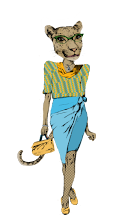Between 2014 and 2017, the
IPKat’s Merpel provided the IP community and the general public with information
and insights from the unrest and management issues at the European
Patent Office (EPO). In that same spirit, AfroLeopa has taken it upon
herself to provide readers of this blog with relevant information regarding the
governance issues of Nigeria’s major collecting society, Collecting Society of
Nigeria (COSON).
Last month, AfroLeopa attended
a press conference co-convened by the president of the Association of Music
Business Professionals (AM. B-Pro), Mr. Edi Lawani under the auspices of
Concerned Stakeholders’ Forum. The majority of the music artists and COSON members,
who spoke at the event, aligned themselves with the statements made by Mr.
Lawani urging the NCC to lift the suspension of COSON’s licence in the
interests of artists and copyright owners. Regulation 20 (2) of the CMO Regulations stipulates that a suspension order from the NCC may be commuted to a
revocation of licence if the
collecting society fails to comply with the directives that led to its suspension
in the first place. Some
copyright owners have expressed support
for the l icence
A communiqué
was issued in which the NCC was urged to audit COSON and also collaborate with specialised
agencies such as the Nigerian police and the Economic and Financial Crimes
Commission (EFCC) to arrest the ousted and allegedly reinstated Chairman) Chief
Tony Okoroji. [As far as AfroLeopa is aware at the time of writing, no arrests
have been made and there has been no directive has been issued regarding lifting
the suspension of COSON’s licence .]
The powers of the NCC as sector regulator for
the copyright industry are wide. Further, the NCC has a discretion regarding
the power it chooses to exercise in any given situation involving collecting
societies. For instance, the NCC has a choice to treat the COSON leadership
tussle as a dispute between members and apply its dispute resolution powers
under Regulation 15 of the CMO Regulations. As required by the CMO Regulations,
all Board members of COSON, with the exception of the General Manager, are
artists and copyright owners. It may also decide to appoint an auditor to
investigate COSON’s affairs, especially its governance structures and processes.
Further, it may (as it has elected to) suspend COSON’s licence to operate as a
collecting society.
However,
it is important, especially in governance issues of collecting societies that
the discretion of the NCC and the powers it exercises are effective and able to
achieve desired results. It is equally
important that petitions/suggestions to the NCC in such instances are couched
in language that shows the correlation between each specific powers, available
facts and probable results.









